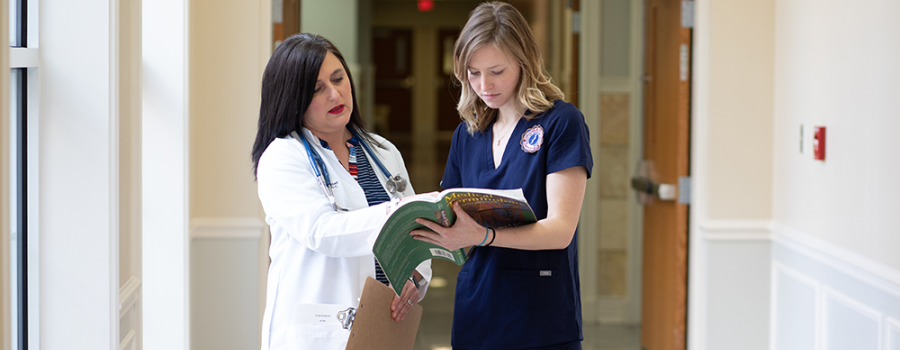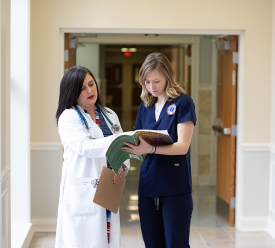Make a difference in the eyes of others through a career in optometry!
As a pre-optometry student at University of the Cumberlands, you will complete a rigorous pre-professional health curriculum designed to support strong optometry school preparation. This pathway builds a solid foundation in biology, chemistry, physics, and advanced sciences, equipping you with the academic preparation and critical thinking skills required for admission to competitive optometry and other health professional programs.
A pre-optometry degree bridges undergraduate study with specialized graduate education while allowing flexibility to explore related natural science interests. Whether you pursue clinical optometry, vision research, or broader healthcare applications, this program prepares you for a profession that combines strong earning potential with the meaningful impact of improving vision health and patient quality of life.
By the Numbers
Programs & Requirements
* The credit hours listed on this page only reference the specific program requirements and is not reflective of the total hours necessary to receive your degree. Cumberlands requires all students obtain a minimum of 60 hours for an associate’s degree and a total of 120 hours for a bachelor’s degree. Transfer and prior learning credits may be counted toward those totals.
To learn more about our General Education Requirements, please visit the page referenced below or explore our Academic Catalog.
While you have the option as a pre-optometry student to choose a major in almost any subject, most professional optometry graduate programs prefer students who have successfully completed courses in physics, chemistry, biology, and mathematics, as well as having a strong background in English, humanities, and social sciences. The ability to solve scientific problems and a broad-based undergraduate education are considered essential for optometry students. If you want a well-rounded undergraduate background preferred by most professional schools of optometry, then Cumberlands' Bachelor of Science with a Major in Biology - Pre-Professional Health Emphasis is the perfect program for you.
Course Requirements
Students interested in applying to medical, dental, or veterinary school are strongly encouraged to complete these courses. It is important to review the admissions requirements requirements for each program to which you will apply because the prerequisites for admission may be slightly different among professional schools.
- BIOL 331 - Vertebrate Embryology
- BIOL 342 - Parasitology
- BIOL 345 - Microbiology
- BIOL 346 - Biochemistry
- BIOL 436 - Medical Biochemistry
- BIOL 441 - Immunology
- BIOL 442 - Comparative Anatomy
- BIOL 443 - General Physiology
- BIOL 445 - Molecular Biology
- BIOL 446 - Advanced Cell Biology
- BIOL 447 - Histology
This option is recommended for students entering a “blended” area such as pre-professional medically related areas (medicine, dentistry, pharmacy, physician assistant, physical therapist, etc.), chemistry/business, and chemistry/biology.
MATH 140, MATH 240, PHYS 241, and PHYS 242 are prerequisites for some upper-level chemistry courses.
- CHEM 132 - General College Chemistry I
- CHEM 111 - General Chemistry Laboratory I
- CHEM 232 - General College Chemistry II
- CHEM 211 - General Chemistry Laboratory II
- CHEM 331 - Organic Chemistry I
- CHEM 321 - Organic Chemistry Laboratory I
- CHEM 332 - Organic Chemistry II
- CHEM 322 - Organic Chemistry Laboratory II
- CHEM 336 - Analytical Chemistry
- CHEM 328 - Analytical Chemistry Laboratory
- CHEM 441 - Physical Chemistry I with Laboratory
- CHEM 434 - Inorganic Chemistry
- CHEM 490 - Senior Research Project
- CHEM 491 - Selected Topics in Chemistry
A Bachelor of Arts degree requires completing the same courses as a Bachelor of Science with the addition of completing one foreign language sequence through the intermediate level.
- FREN 131 Elementary French I
- FREN 132 Elementary French II
- FREN 231 Intermediate French I
- FREN 232 Intermediate French II
- SPAN 131 Elementary Spanish I
- SPAN 132 Elementary Spanish II
- SPAN 231 Intermediate Spanish I
- SPAN 232 Intermediate Spanish II
Take the Next Step
Mission and Goals
The mission of the pre-optometry program at University of the Cumberlands is to provide the knowledge and skills that will prepare you for optometry school and help you succeed in various fields of service in healthcare and related sciences.
Pre-Optometry Careers & Outcomes
All stats from U.S. Bureau of Labor Statistics
Optometrist: $124,300
Optometrist: $124,300
Optometrists diagnose, manage, and treat conditions and diseases of the human eye and visual system, including examining eyes and prescribing corrective lenses.
Optician: $37,570
Optician: $37,570
Opticians help fit eyeglasses and contact lenses, following prescriptions from ophthalmologists and optometrists.
Ophthalmologist: $219,810
Ophthalmologist: $219,810
Ophthalmologists diagnose and perform surgery to treat and help prevent disorders and diseases of the eye. May also provide vision services for treatment including glasses and contacts.
Natural Sciences Manager: $137,900
Natural Sciences Manager: $137,900
Natural sciences managers supervise the work of scientists, including chemists, physicists, and biologists.
Medical Scientist: $95,310
Medical Scientist: $95,310
Medical scientists conduct research aimed at improving overall human health.
Laboratory Director: $101,340
Laboratory Director: $101,340
Medical and health services managers plan, direct, and coordinate the business activities of healthcare providers.
Common Questions
A pre-optometry program is an undergraduate pathway that prepares students for optometry school and careers in the natural sciences. It provides foundational knowledge in biology, chemistry, and mathematics, along with basic concepts of optometry, helping students transition smoothly to more advanced studies in optometry or related healthcare fields.
The pre-optometry program typically requires around 53 credit hours specific to the program, though completing a bachelor's degree generally takes four years of full-time study. This timeline includes general education and program-specific coursework, which prepares students for optometry school.
The pre-optometry program mentioned is on-campus, which offers the hands-on experience and in-person instruction required for scientific disciplines like optometry. Students should check with the institution to see if there are any hybrid or remote learning options available.
Yes, a pre-optometry program can be worth it, particularly for students planning to attend optometry school. Careers in optometry, such as becoming an optometrist or ophthalmologist, offer high salaries, with optometrists earning an average of $124,300 annually. The program also opens doors to other careers in healthcare and natural sciences.
With a pre-optometry program, you can pursue a career as an optometrist, optician, or ophthalmologist. It can also serve as a stepping stone toward roles in healthcare management, medical science research, or laboratory direction. The program builds the necessary foundation for advanced optometry education and diverse opportunities in science and healthcare.
To get into a pre-optometry program, you need to apply to a university offering the program and meet the institution's admission requirements. These typically include completing high school courses in subjects like biology, chemistry, and mathematics, along with meeting general admission criteria such as GPA and standardized test scores.
Faculty Experts in Pre-Optometry
Get to know about the pre-optometry faculty you'll interact with at Cumberlands.

Ms. Kara Stanley

Jeffrey Schwarz
Jeffrey Schwarz
Contact Information

Dr. Leif Deyrup
Dr. Leif Deyrup
Contact Information
Request Information
Have questions? Let us answer them.

